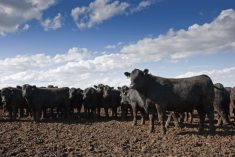Western Canadian feeder cattle markets experienced a softer tone over the past week. Alberta prices were generally steady to $4 lower while in the eastern Prairies, markets were $4 to $7 below week-ago levels.
The weaker tone in the deferred futures, along with the stronger Canadian dollar, were the main factors weighing on feeder values. Adverse weather in the Midwest caused U.S. buyers to shy away this week, especially in Manitoba.
Secondly, major operations are extremely risk-averse on purchases; if managers can’t lock in the profit on replacement cattle, they’re not betting on higher prices, given the current losses on unhedged cattle. The markets in Alberta set the price structure and auction markets in the non-major feeding regions were priced with appropriate freight discounts and shipping risk factors. A very defensive tone was set with order buyers shopping to place cattle this week and feedlots looking for reasons to be patient and placing scale-down orders.
Read Also

U.S. grains: CBOT soybeans, corn, wheat fall in USDA data aftermath
Chicago grains took a dive on Friday, following a closely watched U.S. government crop report and the release of export data that could provide clues into Chinese buying.
In central Alberta, mixed steers weighing between 885 and 900 lbs. sold in the range of $200-$215 with buyers extremely sensitive to flesh characteristics. Higher-quality lower-flesh 900-lb. heifers were trading up to $200 in the same region. Controlled weight-gain light grain-fed cattle were carrying a slight premium, but buyers quickly backed away from cattle that looked too hard. Mixed steers averaging 600 lbs. were averaging $268 in central Alberta while similar cattle in central Saskatchewan and southern Manitoba were in the range of $255-$260.
Light buying interest was surfacing for grassers, but feedlot operators are factoring in a sharp year-over-year increase in second- and third-quarter U.S. beef production. There’s a negative bias on the fed cattle prices for this time frame, which is weighing on the feeder market. Statistics Canada estimated feed barley usage from Aug. 1 to Dec. 31 at three million tonnes, up 18 per cent over the same period of 2014. This barley market is expected to strengthen later in spring, so feedlots are factoring in higher cost per pound gains. I believe these are the main factors resulting in the softer feeder market after a discouraging margin structure the last few months.
— Jerry Klassen is manager of the Canadian office for Swiss-based grain trader GAP SA Grains and Produits. He is also president and founder of Resilient Capital, which specializes in proprietary commodity futures trading and commodity market analysis. Jerry owns farmland in Manitoba and Saskatchewan but grew up on a mixed farm/feedlot operation in southern Alberta, which keeps him close to the grassroots level of grain and cattle production. Jerry is a graduate of the University of Alberta. He can be reached at 204-504-8339.















